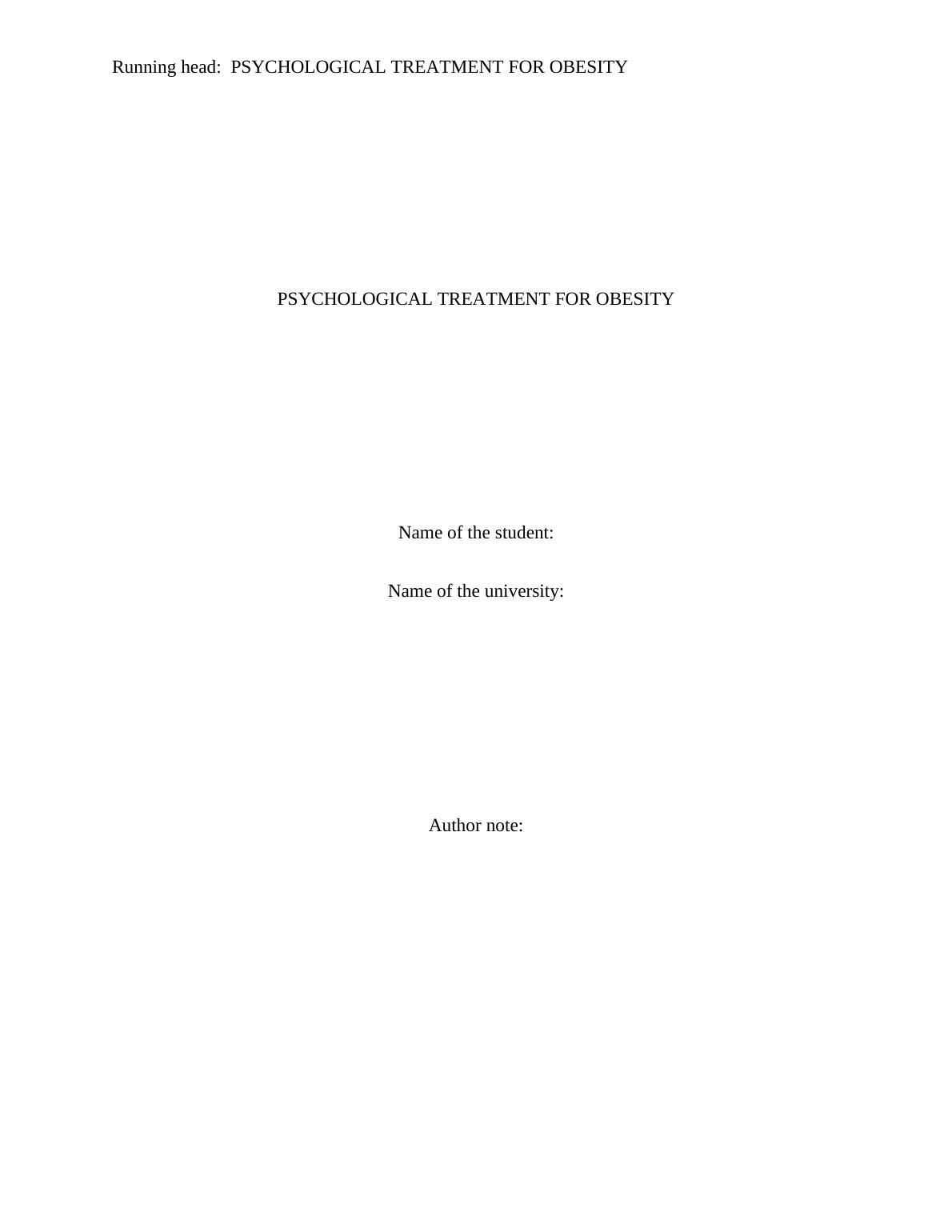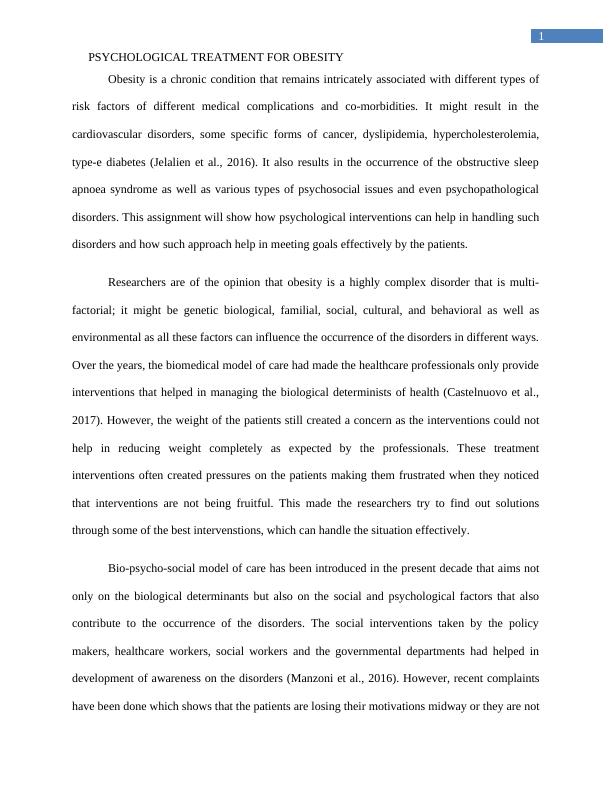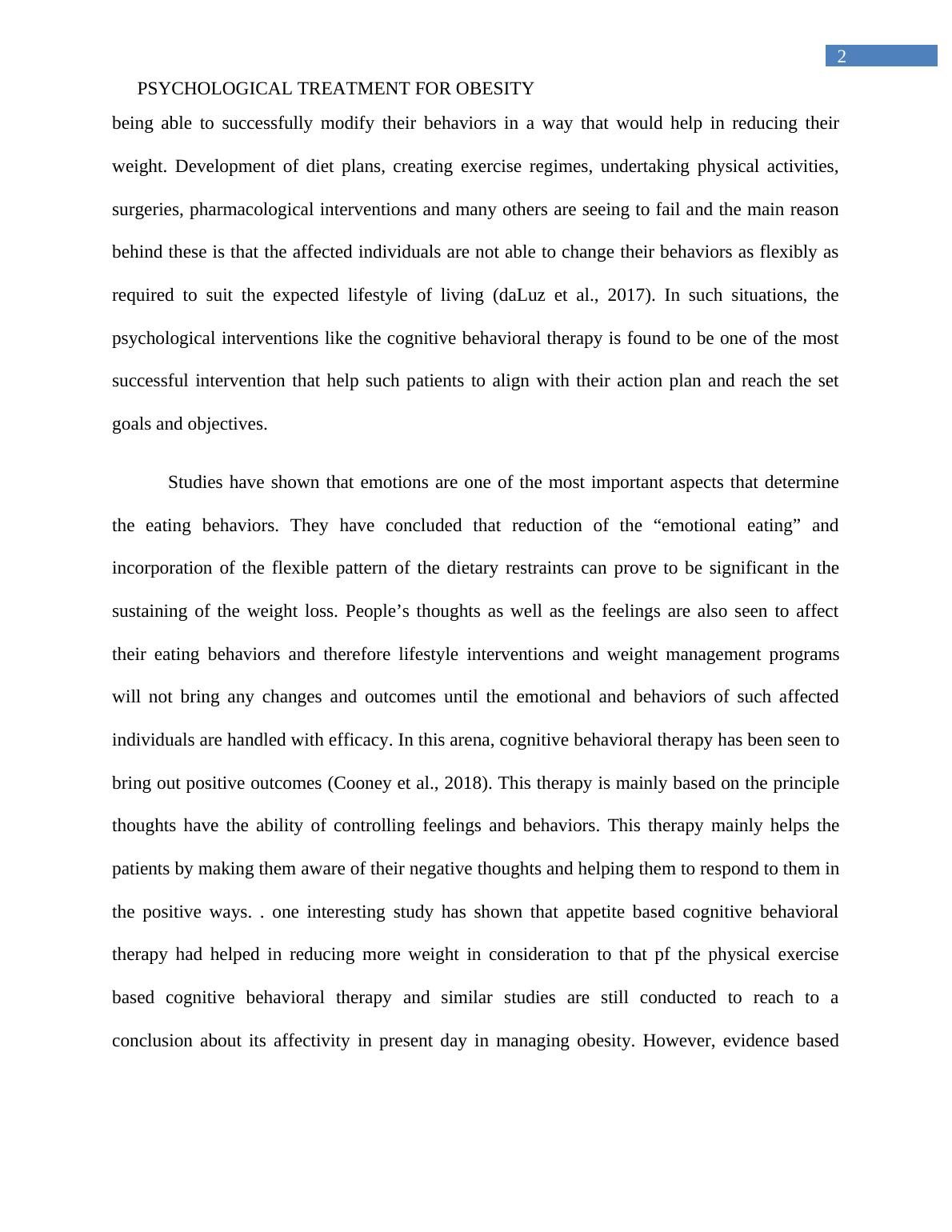Psychological Treatment for Obesity
Added on 2023-06-07
7 Pages1767 Words145 Views
Running head: PSYCHOLOGICAL TREATMENT FOR OBESITY
PSYCHOLOGICAL TREATMENT FOR OBESITY
Name of the student:
Name of the university:
Author note:
PSYCHOLOGICAL TREATMENT FOR OBESITY
Name of the student:
Name of the university:
Author note:

1
PSYCHOLOGICAL TREATMENT FOR OBESITY
Obesity is a chronic condition that remains intricately associated with different types of
risk factors of different medical complications and co-morbidities. It might result in the
cardiovascular disorders, some specific forms of cancer, dyslipidemia, hypercholesterolemia,
type-e diabetes (Jelalien et al., 2016). It also results in the occurrence of the obstructive sleep
apnoea syndrome as well as various types of psychosocial issues and even psychopathological
disorders. This assignment will show how psychological interventions can help in handling such
disorders and how such approach help in meeting goals effectively by the patients.
Researchers are of the opinion that obesity is a highly complex disorder that is multi-
factorial; it might be genetic biological, familial, social, cultural, and behavioral as well as
environmental as all these factors can influence the occurrence of the disorders in different ways.
Over the years, the biomedical model of care had made the healthcare professionals only provide
interventions that helped in managing the biological determinists of health (Castelnuovo et al.,
2017). However, the weight of the patients still created a concern as the interventions could not
help in reducing weight completely as expected by the professionals. These treatment
interventions often created pressures on the patients making them frustrated when they noticed
that interventions are not being fruitful. This made the researchers try to find out solutions
through some of the best intervenstions, which can handle the situation effectively.
Bio-psycho-social model of care has been introduced in the present decade that aims not
only on the biological determinants but also on the social and psychological factors that also
contribute to the occurrence of the disorders. The social interventions taken by the policy
makers, healthcare workers, social workers and the governmental departments had helped in
development of awareness on the disorders (Manzoni et al., 2016). However, recent complaints
have been done which shows that the patients are losing their motivations midway or they are not
PSYCHOLOGICAL TREATMENT FOR OBESITY
Obesity is a chronic condition that remains intricately associated with different types of
risk factors of different medical complications and co-morbidities. It might result in the
cardiovascular disorders, some specific forms of cancer, dyslipidemia, hypercholesterolemia,
type-e diabetes (Jelalien et al., 2016). It also results in the occurrence of the obstructive sleep
apnoea syndrome as well as various types of psychosocial issues and even psychopathological
disorders. This assignment will show how psychological interventions can help in handling such
disorders and how such approach help in meeting goals effectively by the patients.
Researchers are of the opinion that obesity is a highly complex disorder that is multi-
factorial; it might be genetic biological, familial, social, cultural, and behavioral as well as
environmental as all these factors can influence the occurrence of the disorders in different ways.
Over the years, the biomedical model of care had made the healthcare professionals only provide
interventions that helped in managing the biological determinists of health (Castelnuovo et al.,
2017). However, the weight of the patients still created a concern as the interventions could not
help in reducing weight completely as expected by the professionals. These treatment
interventions often created pressures on the patients making them frustrated when they noticed
that interventions are not being fruitful. This made the researchers try to find out solutions
through some of the best intervenstions, which can handle the situation effectively.
Bio-psycho-social model of care has been introduced in the present decade that aims not
only on the biological determinants but also on the social and psychological factors that also
contribute to the occurrence of the disorders. The social interventions taken by the policy
makers, healthcare workers, social workers and the governmental departments had helped in
development of awareness on the disorders (Manzoni et al., 2016). However, recent complaints
have been done which shows that the patients are losing their motivations midway or they are not

2
PSYCHOLOGICAL TREATMENT FOR OBESITY
being able to successfully modify their behaviors in a way that would help in reducing their
weight. Development of diet plans, creating exercise regimes, undertaking physical activities,
surgeries, pharmacological interventions and many others are seeing to fail and the main reason
behind these is that the affected individuals are not able to change their behaviors as flexibly as
required to suit the expected lifestyle of living (daLuz et al., 2017). In such situations, the
psychological interventions like the cognitive behavioral therapy is found to be one of the most
successful intervention that help such patients to align with their action plan and reach the set
goals and objectives.
Studies have shown that emotions are one of the most important aspects that determine
the eating behaviors. They have concluded that reduction of the “emotional eating” and
incorporation of the flexible pattern of the dietary restraints can prove to be significant in the
sustaining of the weight loss. People’s thoughts as well as the feelings are also seen to affect
their eating behaviors and therefore lifestyle interventions and weight management programs
will not bring any changes and outcomes until the emotional and behaviors of such affected
individuals are handled with efficacy. In this arena, cognitive behavioral therapy has been seen to
bring out positive outcomes (Cooney et al., 2018). This therapy is mainly based on the principle
thoughts have the ability of controlling feelings and behaviors. This therapy mainly helps the
patients by making them aware of their negative thoughts and helping them to respond to them in
the positive ways. . one interesting study has shown that appetite based cognitive behavioral
therapy had helped in reducing more weight in consideration to that pf the physical exercise
based cognitive behavioral therapy and similar studies are still conducted to reach to a
conclusion about its affectivity in present day in managing obesity. However, evidence based
PSYCHOLOGICAL TREATMENT FOR OBESITY
being able to successfully modify their behaviors in a way that would help in reducing their
weight. Development of diet plans, creating exercise regimes, undertaking physical activities,
surgeries, pharmacological interventions and many others are seeing to fail and the main reason
behind these is that the affected individuals are not able to change their behaviors as flexibly as
required to suit the expected lifestyle of living (daLuz et al., 2017). In such situations, the
psychological interventions like the cognitive behavioral therapy is found to be one of the most
successful intervention that help such patients to align with their action plan and reach the set
goals and objectives.
Studies have shown that emotions are one of the most important aspects that determine
the eating behaviors. They have concluded that reduction of the “emotional eating” and
incorporation of the flexible pattern of the dietary restraints can prove to be significant in the
sustaining of the weight loss. People’s thoughts as well as the feelings are also seen to affect
their eating behaviors and therefore lifestyle interventions and weight management programs
will not bring any changes and outcomes until the emotional and behaviors of such affected
individuals are handled with efficacy. In this arena, cognitive behavioral therapy has been seen to
bring out positive outcomes (Cooney et al., 2018). This therapy is mainly based on the principle
thoughts have the ability of controlling feelings and behaviors. This therapy mainly helps the
patients by making them aware of their negative thoughts and helping them to respond to them in
the positive ways. . one interesting study has shown that appetite based cognitive behavioral
therapy had helped in reducing more weight in consideration to that pf the physical exercise
based cognitive behavioral therapy and similar studies are still conducted to reach to a
conclusion about its affectivity in present day in managing obesity. However, evidence based

End of preview
Want to access all the pages? Upload your documents or become a member.
Related Documents
The Assignment on Mental Health and Illnesslg...
|7
|1718
|22
Assignment: Biopsychosocial Model of Carelg...
|10
|2832
|106
Hierarchy and Power in Australian Healthcare Systemlg...
|13
|3703
|143
Eating Disorders: Multidisciplinary Assessment and Interventionslg...
|11
|2953
|263
Multidisciplinary Assessment and Interventions PDFlg...
|11
|2904
|19
Mental Health Nursing: Eating Disorder Case Studylg...
|11
|3466
|286
